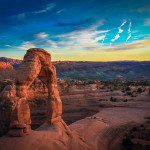Psalm 8:1-9 The Greatest Glory
Psalm 8:1-9 The Greatest Glory is the first sermon in a series on “The Greatest.”
If you look in your Baptist hymnals, you will see a song that is based upon this psalm. Turn to page 29. Let me sing this song for you.
Song: “Oh Lord Our Lord How Majestic Is Your Name In All The Earth” by Michael W. Smith.
Now let’s sing this song together.
One can look at Psalm 8 like a modern song. There is a refrain that is repeated twice (once at the beginning and once at the end). There are three strophes or verses.
The word “gittith” in the superscription does not refer to a musical instrument but rather to a tempo to which this psalm was to be accompanied. Most scholars believe that it refers to a marching tempo popular in the land of Gath.1
When you look at Psalm 8, you can see that it divides evenly into three parts. These verses are a commentary on Genesis 1, the creation account. You see that it describes first about humanity, then the heavens, and finally about the home, we have here on Earth. In these verses, we see three reasons why I should give God glory.
THREE REASONS WHY I SHOULD GIVE GOD GLORY2
The psalm plays out like a song and the first verse reveals that God’s majesty derives from His glory.
Verse #1:
God’s name is majestic because of His glory. (Psalm 8:1)
“Yahweh, our Lord, how magnificent is Your name throughout the earth! You have covered the heavens with Your majesty.” (Psalm 8:1, HCSB)
This is the verse and the chorus. I magnify God’s name and glorify Him. People just looked up to the heavens and associated God’s power and majesty with it.
In 1983 an infrared astronomy satellite detected more than two hundred thousand new objects in the heavens, including twenty thousand galaxies. In 1987, astronomers discovered the largest structures ever seen in the universe—mysterious, glowing blue arcs approximately two million trillion miles long. It took eleven months for the Viking I spacecraft, traveling at fifty-seven thousand miles an hour, to reach Mars, two hundred twenty million miles away. But that is a trip next door compared to the infinitesimal distances between earth and other stars. Consider that a light year is nearly six trillion miles, the distance light travels in a year at 186,282 miles per second. The closest star to earth, Alpha Centauri, is four and a half light years away. The most remote objects now known in the universe are ninety-eight light years from earth. The colossal geometrics of creation!
Modern astronomers did not invent the universe’s expansiveness. More than 1,700 years ago Ptolemy taught that the earth should be regarded as insignificant compared to the vast distances in the universe. Long before Ptolemy speculated, God called Abraham from his tent one night and challenged him to count the stars if he could. Our telescopes have simply sensitized us to distances previous generations could not measure—but before which they stood baffled and dazzled. Why hasn’t the Creator received awe equal to the awe given his creation? If what he made staggers our imagination, how unimaginable is his majesty!3
Think on that for a minute. If the heavens boggle my mind, then I can’t even imagine how greater God is. But I can know it. I can know it and trust that glory like a child to help me.
Like a child I learn to rely on His strength to help me. (Psalm 8:2)
“Because of Your adversaries, You have established a stronghold from the mouths of children and nursing infants to silence the enemy and the avenger.” (Psalm 8:2, HCSB)
Jesus quotes this verse in the context of proper worship in Matthew 21:
“and said to Him, “Do You hear what these children are saying?” “Yes,” Jesus told them. “Have you never read: You have prepared praise from the mouths of children and nursing infants?”” (Matthew 21:16, HCSB)
The point that Jesus makes about this verse is that children are right to praise Him. They praise Him because He is strong enough to help them.
My worship of God’s glory like a child reveals where my strength comes from. We come to worship today not because we are strong but because we are weak. Jon Courson states:
“Haven’t you read that that’s what this place is to be continually where praise ascends, prayer is offered, people helped, and power expressed?”4
The second verse shows that God is majestic and glorious because of His love for us.
Verse #2:
God’s name is majestic because of His love. (Psalm 8:3)
“When I observe Your heavens, the work of Your fingers, the moon and the stars, which You set in place,” (Psalm 8:3, HCSB)
Here we see that God worked the universe with his fingers. He spent meticulous time to work out the details of creating the universe. And humanity is part of that universe that He created. Humanity was part of His creation, and yet humanity was His masterpiece. God chose to create humans. Each and every individual human that God created is an act of love. His entire motive in creating us was love – God did it for no other reason. Babies are not made like a simple chemistry lab experiment. Babies cannot be boiled down to just a chemical formula or a biological concept. Babies are an expression of love to the ones who created those babies, namely the parents.
To create is an act that is derived from love. Someone does not decide to make babies for financial reasons. The same is true with God. He never needed to create to fulfill Himself. God never said: “I don’t feel well. I think I will cure it by creating.” God expressed great love in choosing to create us. He did not need to think about it at all. God has His glory – the Holy Spirit, Jesus and God the Father – they reflect each other, stay in complete unity and harmony for eternity. It had always been so.
God chose to love, not because He needed to fulfill some longing in His heart. God chose to love because of His own free, independent, and magnificent sovereign will. He chose to create a universe. The first recorded expression of God’s responsible love in creation is the universe.5
NASA scientists say they will find proof of life on other planets within 20 years. The James Webb Space Telescope will launch in 2018 and will be capable of detecting the signs of life in the atmospheres of other planets. Scientists are understandably excited about such prospects. Matt Mountain, director of the Space Telescope Science Institute in Baltimore, says, “Just imagine the moment when we find potential signatures of life. Imagine the moment when the human race realizes that its long loneliness in time and space may be over.”
Of course, only recently have we thought of ourselves as lonely in time and space. Most of us believe we have been accompanied in the universe by heavenly beings, including the Lord of the universe, since the beginning. We are not now, nor have we ever been, alone in the universe.6
If I know that because of God’s glory, I can know that He loves me. I can continue to think about how He cares for me.
Like a mortal, I continue to wonder about His care for me. (Psalm 8:4)
“what is man that You remember him, the son of man that You look after him?” (Psalm 8:4, HCSB)
The psalm calls attention to the question of Psalm 8:4 as the literary center. In other words, the center of the psalm calls attention to a question about man. The phrase may sound like Shakespeare, but it actually comes from Psalm 8. But if this sounds familiar, the writer to the Hebrews likely heard the messianic overtone in this phrase.7 That is why he quotes this part of the psalm.
“But one has somewhere testified: What is man that You remember him, or the son of man that You care for him? You made him lower than the angels for a short time; You crowned him with glory and honor and subjected everything under his feet. For in subjecting everything to him, He left nothing that is not subject to him. As it is, we do not yet see everything subjected to him.” (Hebrews 2:6–8, HCSB)
The New Testament writer to the Hebrews saw a messianic tone. The question here in Psalm 8 is about humanity, not about Jesus. The phrase Son of Man became a messianic title, but here it is probably a synonym of “mankind.” You will notice that the phrase is not capitalized. This verse is asking the same question in two different ways. It is asking: What is the whole of humanity that God remembers them? What are people that God looks after them? The psalmist here is reflecting on the way that God takes care of himself. He looks up in the night sky to the universe and wonders how God is willing to look after people?
Have you not done the same thing? Have you ever reflected on the great glory of God and wondered how or why He takes care of you?
When you do that, when you wonder about how God takes of you, it leads you to His grace.
Verse #3:
God’s name is majestic because of His grace. (Psalm 8:5)
“You made him little less than God and crowned him with glory and honor.” (Psalm 8:5, HCSB)
Contrast the creation of the first man according to Genesis 2 with the creation of the first human beings according to Mesopotamian tradition. Both start with dust or clay, but then the accounts vary.
In the Mesopotamian creation account, Enuma Elish, humanity’s dust is mixed with the blood of a demon god killed for his treachery against the second generation of gods. Humans are demons from the time they’re born. According to Atrahasis, the second ingredient is the spit of the gods, a far cry from the glorious breath of the biblical Creator!
The creation process according to Mesopotamian tradition fits well with the overall low view of humanity professed by that culture. According to Atrahasis, humans were created with the express purpose of relieving the lesser gods from the arduous labor of digging irrigation ditches.
By contrast, the Genesis account teaches that human beings, male and female, were created in the image of God to rule over every living thing that has the breath of life in it (Genesis 1:30).8
“for all the wildlife of the earth, for every bird of the sky, and for every creature that crawls on the earth—everything having the breath of life in it. I have given every green plant for food.” And it was so.” (Genesis 1:30, HCSB)
David knows how God created humanity. David, also a man of war, knows about human cruelty. So he is amazed that God allowed humanity to exist. But even more than that, God gave humanity power over the Earth and everything in it. God gave humanity power over God’s creation (Psalm 8:5-8). I think David is amazed at the ability for God to let go of all His creation to His highest creation – humanity. When you consider what humanity has done to each other and the world, it is mind-boggling that God would allow us to receive such grace. Grace that gives us dignity as human beings can only come from God. That is what truly makes God majestic and His name magnificent (Psalm 8:9).9
You see this because as the “imagers” of God, or bearers of God’s image, God has given humanity a responsibility to be a manager of this Earth. So God is gracious to me, despite me, and yet He gives me a great responsibility.
Like a manager, I have been given a great responsibility (Psalm 8:6-8)
“You made him lord over the works of Your hands; You put everything under his feet:” (Psalm 8:6, HCSB)
God has put this Earth under our control. This is the reason that this psalm describes the fact that nature is under the control of humanity.
“all the sheep and oxen, as well as the animals in the wild, the birds of the sky, and the fish of the sea that pass through the currents of the seas.” (Psalm 8:7–8, HCSB)
The animal kingdom is under the feet of the human kingdom. Yet, the human kingdom is under God’s kingdom. That is why this psalm ends with a chorus that says to give God glory. When you think about God’s glory, love and grace, it should prompt you and me to praise Him.
Chorus: When I see all that God has done for me, I want to give Him the greatest glory!
“Yahweh, our Lord, how magnificent is Your name throughout the earth!” (Psalm 8:9, HCSB)
End with the chorus of the song.
Oh Lord our Lord how majestic is
Your name in all the earth
Oh Lord our Lord how majestic is
Your name in all the earth
Oh Lord we praise Your name
Oh Lord we magnify Your name
Prince of Peace Mighty God
Oh Lord God Almighty10
1 Russell H. Dilday Jr. and J. Hardee Kennedy, “Psalms,” in The Teacher’s Bible Commentary, ed. H. Franklin Paschall and Herschel H. Hobbs (Nashville: Broadman and Holman Publishers, 1972), 295–296.
2 Greg Breazeale “The Name of the King – Psalm 8”, Internet, http://www.lifeway.com/Article/sermon-name-of-the-king-majestic-psalm-8, accessed on 9 June 2017.
3 Virgil Hurley, Speaker’s Sourcebook of New Illustrations, electronic ed. (Dallas: Word Publishers, 2000), 244.
4 Jon Courson, Jon Courson’s Application Commentary: Volume Two: Psalms-Malachi (Nashville, TN: Thomas Nelson, 2006), 10.
5 Jim Erwin, “God Chooses to be Responsible with His Love by Creating,” Psalm 8:1-9, 9 March 2006, Simple Thoughts Reflections (2005-2015), Logos Bible Software Notes, Internet, http://www.patheos.com/blogs/jimerwin/2006/03/09/psalm-83-6-god-chooses-to-be-responsible-with-his-love-by-creating/.
6 Jim L. Wilson and Rodger Russell, “Lonely in the Universe?,” in 300 Illustrations for Preachers, ed. Elliot Ritzema (Bellingham, WA: Lexham Press, 2015).
7 C. Hassell Bullock, Psalms 1–72, ed. Mark L. Strauss and John H. Walton, vol. 1, Teach the Text Commentary Series (Grand Rapids, MI: Baker Books, 2015), 61.
8 Craig Brian Larson and Phyllis Ten Elshof, 1001 Illustrations That Connect (Grand Rapids, MI: Zondervan Publishing House, 2008), 51. Originally from Tremper Longman III, Immanuel in Our Place (P&R, 2001).
9 Jim Erwin, “God Should Be Glorified Because He Gave Me Dignity,” Psalm 8:1-9, 1 October 2015, Lectionary Reflections (2014-2015) Year B, Logos Bible Software Notes.














